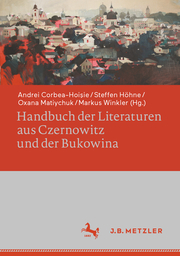Detailansicht
Handbuch der Literaturen aus Czernowitz und der Bukowina
E-Book
Format: PDF
DRM: Digitales Wasserzeichen
- Zusatztext
-
Das Handbuch behandelt die multilinguale Literaturlandschaft Bukowina mit ihrem zentralen Ort Czernowitz (Cernui, ernivci, Czerniowce) vom ausgehenden 18. Jahrhundert bis zur Gegenwart. Unter Berücksichtigung unterschiedlicher kultureller, konfessioneller und politischer Orientierungen, Prägungen und Interessen werden sowohl die nationalphilologischen Traditionen und Kanonisierungen als auch die komplexen und kontinuierlichen Austausch-, Übersetzungs- und Verflechtungsprozesse in den Blick genommen. Dabei wird insbesondere auch der rumänische und ukrainische Forschungsstand zu dieser Region betrachtet. Neben der Forschungsgeschichte der Region und theoretischen Konzepten (Interkulturalität und Raum) werden die kultur-, medien- und literaturgeschichtlichen Phasen sowie einzelne Akteure, Themen und Motive behandelt. Eine biographische Übersicht mit Lebensdaten der wichtigsten literarischen Repräsentanten der Bukowina beschließt den Band. - Die Bukowina kann als Paradigma einerpolykulturell und -lingual verfassten Region verstanden werden, deren literarisch-kulturelles Erbe Wirkungen über die politischen Brüche von 1918, 1940/41 bzw. 1944 und 1991 hinaus entfaltet.
-
- Kurztext
- Named one of The Washington Post's 50 Notable Works of NonfictionWhile the North prevailed in the Civil War, ending slavery and giving the country a"e;new birth of freedom,"e; Heather Cox Richardson argues in this provocative work that democracy's blood-soaked victory was ephemeral. The system that had sustained the defeated South moved westward and there established a foothold. It was a natural fit. Settlers from the East had for decades been pushing into the West, where the seizure of Mexican lands at the end of the Mexican-American War and treatment of Native Americans cemented racial hierarchies. The South and West equally depended on extractive industries-cotton in the former and mining, cattle, and oil in the latter-giving rise a new birth of white male oligarchy, despite the guarantees provided by the 13th, 14th, and 15th Amendments, and the economic opportunities afforded by expansion. To reveal why this happened, How the South Won the Civil War traces the story of the American paradox, the competing claims of equality and subordination woven into the nation's fabric and identity. At the nation's founding, it was the Eastern"e;yeoman farmer"e; who galvanized and symbolized the American Revolution. After the Civil War, that mantle was assumed by the Western cowboy, singlehandedly defending his land against barbarians and savages as well as from a rapacious government. New states entered the Union in the late nineteenth century and western and southern leaders found yet more common ground. As resources and people streamed into the West during the New Deal and World War II, the region's influence grew."e;Movement Conservatives,"e; led by westerners Barry Goldwater, Richard Nixon, and Ronald Reagan, claimed to embody cowboy individualism and worked with Dixiecrats to embrace the ideology of the Confederacy. Richardson's searing book seizes upon the soul of the country and its ongoing struggle to provide equal opportunity to all. Debunking the myth that the Civil War released the nation from the grip of oligarchy, expunging the sins of the Founding, it reveals how and why the Old South not only survived in the West, but thrived.
- Autorenportrait
-
Andrei Corbea-Hoiie ist Professor für Deutsche Literatur an der Universität Alexandru Ioan Cuza Iai (Jassy) und Projektleiter am Institut für Sozial- und Geisteswissenschaften der Rumänischen Akademie in Sibiu (Hermannstadt).
Steffen Höhne ist Professor am Institut für Musikwissenschaft Weimar-Jena (Kulturwissenschaft und -management), Leiter des M.A. Profils Kulturstudien Ostmitteleuropas (Habsburgstudien) an der Hochschule für Musik FRANZ LISZT Weimar und der Friedrich Schiller-Universität Jena. Präsident des Johann Gottfried Herder-Forschungsrats.
Oksana Matiychuk ist stellvertretende Leiterin des International Office und wissenschaftliche Mitarbeiterin am Lehrstuhl für ausländische Literaturgeschichte und Literaturtheorie an der Nationalen Jurij Fedkovy Universität ernivci (Czernowitz). Leiterin der Ukrainisch-Deutschen Kulturgesellschaft ernivci.
Markus Winkler ist wissenschaftlicher Projektmitarbeiter am Institut für deutsche Kultur undGeschichte Südosteuropas (IKGS) an der LMU München.
-
